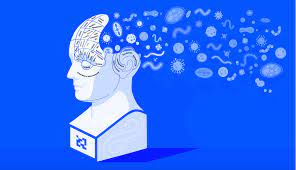The human body contains trillions of microorganisms, including bacteria, viruses, and fungi. While most people associate these microorganisms with disease and infection, research has shown that many of these microbes play a crucial role in maintaining good health. One area of growing interest is the relationship between gut bacteria and mental health. In this article, we will explore the link between gut bacteria and mental health, and whether microbes can influence mood.
The Gut-Brain Axis: Understanding the Connection
The gut and the brain are intimately connected through a complex network of nerve cells, hormones, and other signaling molecules. This connection is known as the gut-brain axis, and research has shown that it plays a crucial role in regulating mood and behavior.
One of the key components of the gut-brain axis is the microbiome. The microbiome is the collection of microorganisms, including bacteria, that live in the gut. These microbes play a critical role in digestion and nutrient absorption, and they also produce a range of chemicals that can affect brain function.
The microbiome can communicate with the brain in a number of ways. One mechanism is through the vagus nerve, which connects the gut to the brain. The microbiome can also produce neurotransmitters and other signaling molecules that can affect mood and behavior.
The Gut Microbiome and Mental Health: What the Research Says
There is growing evidence that alterations in the gut microbiome can contribute to the development of mental health disorders, such as depression and anxiety.
Studies have found that people with depression and anxiety tend to have a different composition of gut bacteria compared to those without these conditions. For example, individuals with depression may have lower levels of certain types of bacteria, such as Bifidobacterium and Lactobacillus.
There is also evidence that alterations in the microbiome can affect brain function and behavior. For example, studies in mice have shown that changes in the microbiome can lead to changes in anxiety-like behavior and social interactions.
Can Probiotics Improve Mood?
Given the link between gut bacteria and mental health, there has been growing interest in the use of probiotics – live microorganisms that can provide health benefits – as a way to improve mood.
Several studies have shown that probiotics can have a positive impact on mental health. For example, a review of 10 studies found that probiotics can improve symptoms of depression and anxiety in people with these conditions.
However, it’s important to note that not all probiotics are created equal. Different strains of bacteria may have different effects on mental health, and more research is needed to determine the optimal probiotic regimen for improving mood.
Conclusion
Overall, the link between gut bacteria and mental health is an area of active research, and there is growing evidence that alterations in the microbiome can contribute to the development of mental health disorders. While more research is needed, the use of probiotics as a way to improve mood shows promise. As our understanding of the gut-brain axis continues to evolve, it’s possible that new therapies for mental health disorders may emerge based on manipulating the gut microbiome.

